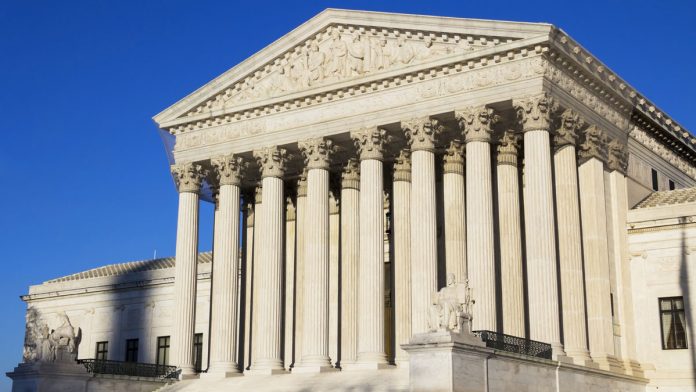Justices: Plain Reading Of Law Supports Denial Of Liquor Wholesale License
Olivia Covington for www.theindianalawyer.com
Indiana beer and wine wholesalers will not be able to also obtain liquor wholesaling permits after the Indiana Supreme Court reversed a trial court’s order issuing a liquor wholesaling permit to an affiliate of Indiana’s largest beer and wine distributor.
The court, excluding Justice Mark Massa, who did not participate, reached that decision Friday in Indiana Alcohol and Tobacco Commission v. Spirited Sales, LLC, 49S00-1611-614, which came before the high court for oral arguments in February. The case traces back to September 2013, when Spirited Sales, LLC, applied to the Indiana Alcohol and Tobacco Commission for a liquor wholesaler’s permit. Spirited is owned by parent company E.F. Transit, Inc., which shares its five shareholders with Monarch Beverage Company, Inc., an Indiana company that holds a beer and wine wholesaler’s permit.
The ATC denied Spirited’s application, noting that EFT and Monarch “operated as the same company,†so allowing Spirited to hold a liquor wholesaling license would be like allowing Monarch to hold the license. Because Monarch already holds a beer and wine wholesaling permit, the commission denied Spirited’s liquor wholesaling permit to prevent Monarch from developing a monopoly over Indiana’s alcoholic beverage market.
Spirited sought judicial review in Marion Superior Court, where Special Judge Heather Welch directed the commission to issue the liquor wholesaling permit to Spirited. Specifically, the trial court found that in light of previous commission decisions that referenced the corporate separateness doctrine in support of granting a permit to businesses whose owners held prohibited interests, the denial of Spirited’s application was arbitrary and capricious.
The ATC sought a stay with the Indiana Court of Appeals, which was denied by a divided panel. Indiana Attorney General Greg Zoeller then filed for an emergency stay in the Indiana Supreme Court, which denied the stay but granted transfer.
In oral arguments before the high court, Indiana Solicitor General Thomas M. Fisher argued Title 7.1 of Indiana Code cannot be understood to allow Monarch, Spirited, EFT and their overlapping ownership to have interests in both liquor and beer wholesaling permits. The justices agreed in their opinion, with Justice Steve David pointing to the prohibited interest laws in Indiana Code sections 7.1-5-9-3(b) and -6. Those statues make it unlawful for the holder of a beer wholesaler’s permit to have an interest in a liquor permit “of any type,†and vice-versa.
Specific to the instant case, the “holder†of a beer wholesaler’s permit is only Monarch, while Monarch’s “interest†in a liquor wholesaling permit would apply more broadly. The justices reached that conclusion pursuant to I.C. 7.1-1-25, which holds a person who is prohibited from holding an interest directly “shall also be prohibited from … holding that interest indirectly.â€
“Here, ties between EFT and Monarch were so extensive that EFT could reasonably be deemed to hold an interest in a beer wholesaler’s permit – an interest prohibited by a combined reading of section 7.1-5-9-6 and 7.1-1-2-5,†David wrote. “Likewise, Monarch and Spirited’s overlapping ownership also bars Spirited from obtaining the sought-after permit.â€
Based on that conclusion, the high court rejected the notion that the ATC’s decision was arbitrary and capricious, noting that under Equicor Dev., Inc. v. Westfield-Washington Twp. Plan Comm’n., 758 N.E.2d 34, 38 (Ind. 2001), prior inconsistent actions are irrelevant.
The justices also determined the denial of Spirited’s application was not based on “political grounds.†Though the trial court made factual findings that Monarch was a “disfavored†wholesaler rejected by the governor’s office, such findings are not supported by the record, the high court said.
Finally, the commission’s denial violated neither the Equal Privileges and Immunities Clause of the Indiana Constitution, nor the due process clauses of the federal and state constitutions, the Supreme Court said. Though “businesses have long lobbied this very contentious point before our General Assembly,†David said determining whether the current regulatory scheme is still relevant and necessary is a question that must be resolved through the political process.
“As for today’s decision, it rests purely on our interpretation of the statute’s language, which we believe is clear on its face,†he wrote.
The 7th Circuit Court of Appeals reached a similar decision earlier this month, affirming Senior District Court Judge Sarah Evans Barker’s ruling that Indiana’s law prohibiting beer wholesalers such as Monarch form holding an interest in a liquor-distribution permit does not violate the prohibited interest law. The Wine & Spirits Distributors of Indiana and Indiana Beverage Alliance celebrated the Indiana Supreme Court’s decision, saying the Friday opinion rejected Monarch’s “assault on the Indiana General Assembly’s and the Alcohol and Tobacco Commission’s authority to regulate alcoholic beverages.â€
“We certainly hope this is the end of Monarch’s efforts to undermine the legislature and create a regulatory environment where anything goes,†the beverage organizations said in a statement issued Saturday. “We also hope this decision puts a stop to the company’s attempts to bully the ATC by burying them in paperwork, intimidating them through wasteful and unnecessary public records requests, and condemning them for doing their job.â€
Monarch CEO Phil Terry declined to comment on the Supreme Court’s decision.





